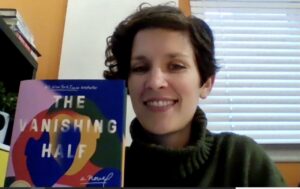
A recent roundtable discussion brought together MCCC’s Gender and Sexuality Alliance and others to cover their favorite parts, of Brit Bennett’s “The Vanishing Half.”
Specifically, the relationships and the themes of gender and identity.
“The Vanishing Half” was chosen for this year’s One Book, One Community program, tackling identity issues like racism and gender.
GSA advisers Jenna Bazzell and Melissa Grey brought up the idea of a roundtable discussion to the members because they said they saw it as an opportunity to open a dialogue with the community.
The GSA presented a slideshow during the discussion on March 31 covering most of the themes covered in the book along with questions to spark ideas amongst the other attendees.
Select topics of discussion included book characters Jude and Reese’s relationship, oppression, passing and identity.Kiera Preston, a GSA leader, said the goal of the roundtable discussion was to hear other people’s perspectives.
“I loved the discussion. I’ve never done something like this. I felt smarter after hearing what everyone had to say,” Preston said.
She said although she was excited about the event, she had some anxiety surrounding the response of the more serious topics covered in the novel.
Preston said she was thankful the participants were understanding of the issues they spoke about during the discussion.
The participant turnout exceeded the expectations of the GSA, Preston said.
She said she was very happy to see so many people there out of pure interest.
The discussion was set to last one hour but was given extended time to account for further discussion.
The GSA did not have the opportunity to present all of their talking points in the time frame, but many participants were eager to share their thoughts on the themes and the novel, so they stayed behind for the rest of the discussion.
Preston said she loved doing the discussion because it helps others acknowledge and understand the issues marginalized groups face on a daily basis.
Bazzell, Grey and Preston each said they find it important to spread the word of stories like those of the characters in the novel because it helps raise awareness on gender diversity and offers minority representation.
“There’s a lot of stigma and political politicization of it (gender diversity),” Grey said. “Right now there are Michigan legislators trying to outlaw trans students from participating in school athletics.” Grey said.
She said covering these issues in the media brings them to light and helps people realize that these issues affect real people.
Preston said she thought the author did an amazing job implementing important topics into the plot so smoothly.
“I’ve never read a book with that great of representation, especially for a trans person,” she said.
She said this type of representation is helpful to LGBTQ+ youth because it helps them realize and understand that other people face the same struggles that they do.
Bazzell said the discussion could have taken off in so many directions, but she could not predict exactly how it would go.
“I was really glad when they didn’t entirely meet those expectations,” she said. “I’m always pleasantly surprised when things like that happened because I believe those are spaces where we get to learn from each other.”

